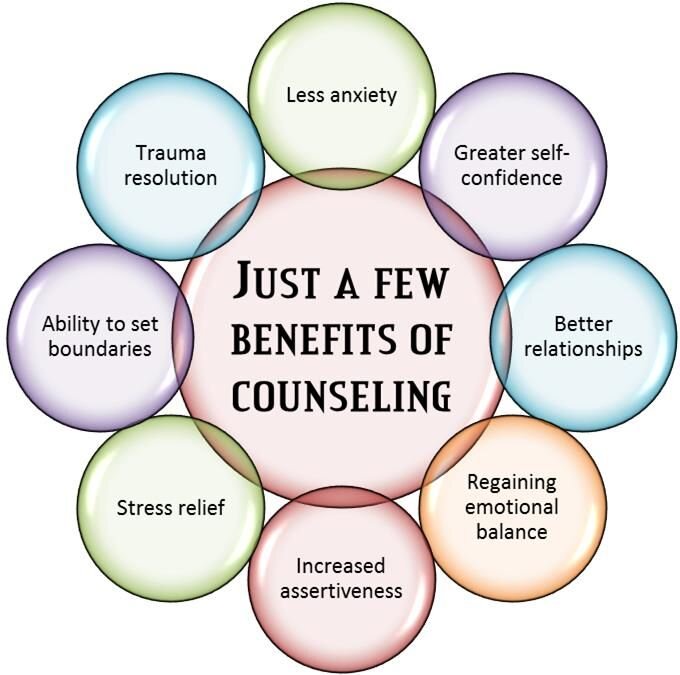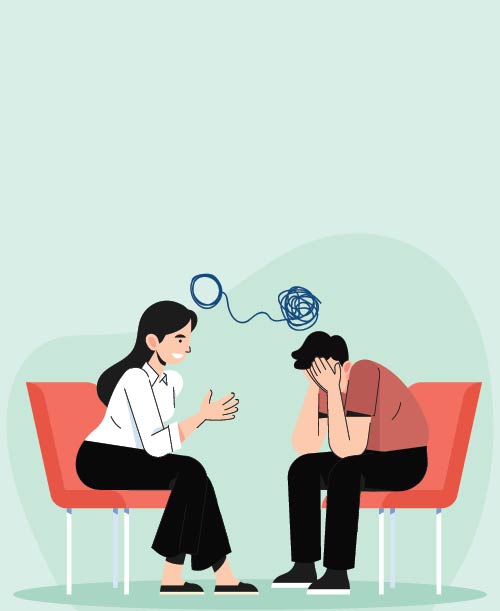Comprehensive Guide to Mental Health And Wellness: Comprehending Counseling, Therapy, and Available Resources
Mental health and wellness is an essential facet of overall wellness. Recognizing the numerous forms of counseling and treatment can equip individuals encountering challenges. Each treatment kind is made to satisfy details demands, offering customized assistance. Several continue to be unaware of the sources readily available to them. This guide intends to brighten these options, addressing common concerns and barriers. It increases a crucial concern: just how can one effectively navigate the complexities of mental health and wellness assistance?
Understanding Mental Health And Wellness and Its Significance
Mental health acts as an essential structure for general health, influencing exactly how individuals believe, feel, and communicate with others. It includes emotional, mental, and social facets, affecting day-to-day performance and lifestyle. Excellent psychological health promotes strength, making it possible for people to handle tension and browse obstacles properly. Alternatively, bad psychological health and wellness can result in a range of problems, consisting of anxiousness, depression, and trouble in relationships.Understanding mental health is essential, as it helps to minimize preconception and urges open discussions concerning psychological battles. Recognition of mental health and wellness likewise stresses the value of self-care and seeking aid when needed. People that prioritize their mental well-being are most likely to take part in healthy and balanced actions, keep meeting partnerships, and add favorably to their neighborhoods. Identifying the importance of mental health and wellness cultivates an alternative technique to health, inevitably enhancing the overall high quality of life for individuals and culture overall.

Sorts of Therapy and Treatment
Reliable psychological healthcare typically involves various forms of therapy and treatment tailored to specific needs. One usual kind is individual counseling, where a specialist works individually with a client to deal with particular concerns. Team therapy, on the other hand, enables individuals to share experiences and support one an additional in an organized setting, usually directed by a facilitator. Household treatment concentrates on improving interaction and settling disputes within household characteristics, while couples therapy addresses relationship difficulties between partners.Additionally, specialized therapy kinds, such as job counseling or despair counseling, target particular life scenarios - Mental Health Resources. Cognitive-behavioral therapy (CBT) stresses the relationship in between sensations, habits, and ideas, whereas all natural strategies could integrate numerous approaches, including mindfulness and art treatment. Each type serves distinct objectives, using diverse paths for people seeking to enhance their mental health and well-being
Typical Restorative Approaches
Various therapeutic strategies play a necessary role in mental health and wellness therapy. Cognitive Behavioral Treatment focuses on transforming negative thought patterns, while Psychodynamic Treatment Techniques explore unconscious processes. Humanistic approaches emphasize individual development and self-actualization, offering varied paths for healing.
Cognitive Behavior Modification
Cognitive Behavioral Treatment (CBT) sticks out as an extensively identified technique in the field of mental health and wellness therapy, emphasizing the link in between actions, ideas, and sensations. This organized, ambitious treatment intends to identify and test adverse idea patterns, allowing individuals to develop much healthier coping systems. CBT is usually used to attend to numerous psychological health and wellness concerns, including anxiousness, clinical depression, and obsessive-compulsive problem. Sessions generally involve the therapist and client working collaboratively to set details goals and examine development. Strategies utilized in CBT might consist of cognitive restructuring, direct exposure therapy, and skill-building workouts. With these techniques, people discover to modify their thought actions and processes, ultimately cultivating emotional strength and improving total mental health.
Psychodynamic Therapy Methods
Psychodynamic therapy strategies concentrate on discovering the unconscious mind to understand how past experiences shape present actions and emotions. Key methods consist of cost-free organization, where clients reveal ideas without censorship, allowing the emergence of subconscious sensations. Dream analysis is another important method, allowing therapists to translate the symbolic significances of dreams, revealing concealed conflicts. Transference plays a significant duty, as clients project sensations and attitudes from past connections onto the specialist, offering understandings right into relational patterns. Additionally, specialists might make use of interpretation, assisting customers gain recognition of underlying concerns and disputes. By promoting a much deeper understanding of interior procedures, psychodynamic treatment intends to advertise psychological healing and individual growth, ultimately enhancing customers' self-awareness and relationships.

Humanistic Approaches Clarified
Humanistic techniques to therapy emphasize the inherent capacity for individual growth and self-actualization within each person. Rooted in the jobs of philosophers like Carl Rogers and Abraham Maslow, these approaches focus on the subjective experiences of customers, cultivating an environment of compassion and acceptance. Therapists commonly make use of strategies such as energetic listening and unconditional favorable respect, allowing customers to explore their thoughts and feelings in a risk-free area. The objective is to help individuals recognize their toughness and establish a much deeper understanding of themselves, eventually leading to higher psychological health. By concentrating on individual worths and self-discovery, humanistic therapy motivates clients to take responsibility for their options and grow a more authentic presence.
Locating the Right Mental Wellness Professional
Discovering the appropriate mental health specialist is necessary for effective treatment. Individuals must understand the numerous kinds of specialists available, such as psycho therapists, psychoanalysts, and accredited counselors. Reviewing their qualifications and experience can aid assure an excellent match for one's particular requirements.
Kinds of Professionals
Guiding via the landscape of psychological health treatment can be frustrating, particularly when it comes to picking the ideal expert. Various sorts of mental health experts exist, each concentrating on various facets of care. Psychoanalysts are clinical doctors that can prescribe medication and address complex psychological health problems. Psycho therapists advice focus on treatment and evaluation, giving counseling and testing solutions. Certified therapists and social workers typically use support via talk treatment, aiding customers navigate life challenges. Marital relationship and family members specialists concentrate on relational issues, intending to company website enhance communication and dynamics within households. Finally, psychological registered nurses provide care and assistance, commonly working along with psychoanalysts to check medicine and treatment strategies. Recognizing these duties can aid people in making notified selections for their psychological health demands.
Examining Credentials and Experience
When seeking the ideal mental health and wellness expert, assessing their credentials and experience is crucial for guaranteeing reliable care. Potential customers must validate that the specialist holds appropriate levels, licenses, and qualifications in their area of competence. In addition, recognizing the therapist's expertise-- such as scientific psychology, community service, or counseling-- can help straighten their abilities with the client's certain requirements. Experience issues, as professionals with a solid track document in dealing with specific conditions might provide a lot more effective techniques - Couples Therapy. Customers may also think about the therapist's approach and approaches by reading endorsements or reviews. Ultimately, a complete analysis of credentials and experience can greatly affect the healing connection and the overall success of mental wellness treatment
Community Resources for Mental Health Assistance
Many neighborhood sources are available to sustain people seeking psychological wellness assistance. Regional mental health companies commonly provide solutions such as therapy, support system, and educational programs focused on advertising psychological health. Several areas also use helplines, which link people with qualified specialists who can provide prompt assistance and guidance.Nonprofit organizations frequently facilitate workshops and area events to increase awareness concerning mental wellness issues and reduce preconception. Colleges and schools might have therapy solutions offered for students, ensuring that youngsters have accessibility to necessary support.Additionally, locations of prayer commonly create risk-free rooms for people to review their psychological health struggles and locate comfort within their communities. By making use of these sources, people can browse their psychological wellness challenges better and discover a sense of belonging and recognizing in their local settings.
Overcoming Barriers to Seeking Help
Many individuals encounter considerable barriers when it pertains to looking for aid for mental health and wellness problems. Stigma frequently looms huge, hindering individuals from reaching out because of be afraid of judgment or misconception. Furthermore, an absence of recognition regarding available resources can make complex the decision-making process, leaving possible customers feeling isolated. Financial restrictions also play a vital role; many individuals can not afford treatment or counseling services, which can exacerbate their struggles. Social differences might affect perceptions of mental health and wellness, making it challenging for some to seek help. Geographical constraints add as well, specifically in country areas where psychological health and wellness professionals may be scarce. Conquering these obstacles needs a multifaceted technique, including education and learning visit here to lower stigma, enhanced access to resources, and raised neighborhood assistance. By attending to these barriers, individuals might really feel much more equipped to seek the assistance they need for their psychological health.

The Duty of Self-Care in Mental Health And Wellness Maintenance
Self-care symbolizes an essential component of psychological health and wellness upkeep, working as a proactive strategy for people to boost their emotional well-being. Participating in self-care activities can considerably lower stress and anxiety, improve mood, and foster durability against life's obstacles. This diverse method consists of physical, psychological, and social facets, permitting people to customize their practices to meet individual needs.Regular workout, a well balanced diet, and enough rest are foundational aspects that support psychological wellness. Additionally, mindfulness practices, such as meditation or journaling, can promote self-awareness and psychological guideline. Social connections further enhance self-care, supplying vital assistance and minimizing sensations of seclusion.
Frequently Asked Inquiries
Just how Do I Know if I Need Therapy?
Identifying the demand for therapy entails acknowledging consistent sensations of despair, anxiousness, or tension, trouble dealing with every day life, or experiencing substantial changes in behavior. Consulting a psychological wellness professional can offer quality and advice.

What Should I Expect During My First Therapy Session?
During the first therapy session, individuals can expect a preliminary evaluation, discussion of issues, and facility of objectives. Counselors usually produce a risk-free atmosphere, motivating open communication while describing the healing process and confidentiality.
Exactly How Long Does Treatment Generally Last?
Therapy duration varies widely, frequently relying on individual requirements and therapy objectives. Normally, sessions can last from a few weeks to numerous months or even years, with regularity and length tailored per person's scenarios.
Are Online Therapy Sessions as Effective as In-Person?
Research indicates that online therapy sessions can be as reliable as in-person ones, depending upon specific preferences and the restorative relationship. Many clients report similar benefits, including ease and ease of access, leading to efficient outcomes.
Can I Switch Therapists if I'm Not Comfortable?
If they really feel awkward, people can switch specialists. It is essential for the healing connection to cultivate trust and convenience, and finding a far better fit can significantly enhance the efficiency of the therapy process. On the other hand, poor psychological wellness can lead to a variety of concerns, including anxiousness, clinical depression, and trouble in relationships.Understanding mental health and wellness is crucial, as it helps to decrease stigma and motivates open discussions about emotional battles. Effective mental health care commonly involves various types of therapy and treatment customized to individual demands. Local mental health companies typically supply solutions such as counseling, assistance groups, and academic programs aimed at promoting mental health. Lots of neighborhoods likewise offer helplines, which attach individuals with qualified experts that can provide prompt support and guidance.Nonprofit organizations regularly assist in workshops and neighborhood occasions to increase understanding regarding mental health concerns and decrease preconception. Colleges and institutions may have therapy services offered for pupils, making certain that young people have access to needed support.Additionally, locations of prayer typically produce risk-free areas for people to discuss their mental health and wellness struggles and locate comfort within their communities.